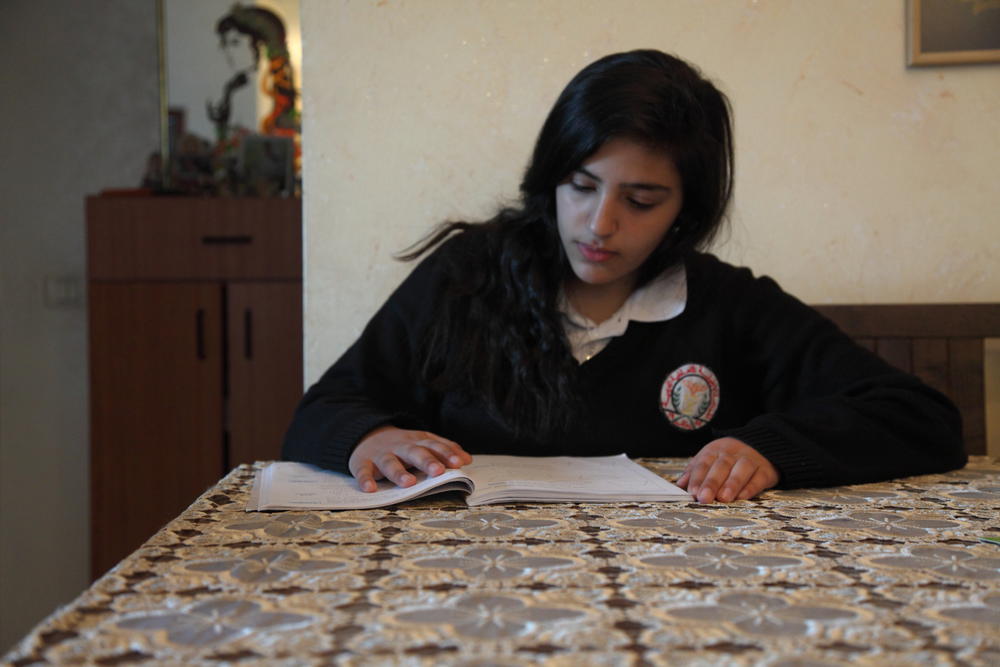
Palestinian prisoners continue to be denied family visits under a pretext of “security” on a systematic basis. On Sunday, 15 January, Rita Abu Ghoulmeh, 13, the daughter of Ahed Abu Ghoulmeh, an imprisoned leader of the Popular Front for the Liberation of Palestine, was traveling to visit her father but was stopped at a checkpoint and told that she was prohibited from visiting her father for undeclared security reasons.
In speaking with Sawt al-Shaab radio, Rita said, “Today I went to visit my dad, and I presented my ID card and permit for the visit, and I was told that the visit was banned. When I asked them why, they told me that the intelligence had made a decision to ban the visit.”
Wafa Abu Ghoulmeh, Rita’s mother and Ahed’s wife, said that this is a continued crime of the Zionist occupation against the rights of Palestinian prisoners and their families, noting that it is a means of collective punishment against an entire family, especially when you see the pretext of “security” used against minor children who have a right to see their parents. Wafa has been denied visits with her husband for years under the same pretext.
The banning of Rita’s visit came only days after Palestinian child prisoner Natalie Shokha, 15, was denied visits from her parents, also on the pretext of “security.” The Palestinian Prisoners Affairs Commission said that family visits “are being used as an instrument of collective punishment in flagrant violation of the Geneva Conventions and international conventions.”
On multiple occasions, the Commission noted, Israeli occupation soldiers at roadblocks and checkpoints tear up visitation permits issued through the International Committee of the Red Cross by the Israeli authorities. On 8 January, Akram Hamed, the representative of prisoners in Ofer prison said that 30 people had been denied visitation with their imprisoned family members, including elderly people over the age of 80 years old. In Hadarim prison, 5 family visit permits were withdrawn when the families arrived at the prison and their permit papers torn up by the occupation forces. Marwan Barghouthi, held in Hadarim prison, raised this issue on behalf of the prisoners with the director of Hadarim prison, saying that the continuation of this policy will lead to escalated protests by Palestinian prisoners.
The denial of family visits is also used as a means of pressure and punishment against Palestinian prisoners, noting that 12 Palestinian prisoners were punished after protesting against an attack by guards with the denial of family visits for 6 months.
Sick prisoner Mansour Moqtada continues to be denied family visits from his elderly mother; Moqtada is serving a life sentence and uses a wheelchair after he was shot with three bullets in 2002 at the same time he was seized by Israeli occupation forces. He has a colostomy and a catheter and is in frequent pain; he is one of the most seriously ill prisoners in Israeli jails and is permanently held at the Ramleh prison clinic. His mother, who is over 70 years old, has continually been denied family visits with her son for over two years under the pretext of unspecified “security” reasons.
The right of prisoners to receive family visits is enshrined in the Fourth Geneva Convention. In addition, the Fourth Geneva Convention forbids the imprisonment of people under occupation in the territory of the occupying power; nevertheless, the vast majority of Palestinian prisoners are detained inside Palestine ’48. Most Palestinian prisoners from the West Bank and Gaza Strip can only receive visits through the visits and permitting process coordinated by the International Committee of the Red Cross (ICRC), because their families are denied access to the areas where they are imprisoned. These permits are often delayed or denied and take months to process; if and when they are approved, Palestinians must visit on special ICRC buses. he entire visit process begins early in the morning and ends late at night for a 45-minute visit; it is very difficult for young children and elderly parents.
Prior to 2016, these visits took place twice monthly for Palestinian prisoners from the West Bank; however, the visits were arbitrarily reduced to once monthly by the ICRC, which cited lack of participation in the second visit and financial concerns to justify their decision. Palestinians have repeatedly protested these cuts to visits, coming as they do at the same time that the Israeli occupation is repeatedly using family visit denial as a weapon against Palestinian prisoners.
Discover more from Samidoun: Palestinian Prisoner Solidarity Network
Subscribe to get the latest posts sent to your email.




